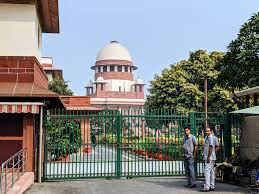For the relief of declaration that the plaintiff with Defendant Nos. 1 and 2 is a coparcener by amended Section 29A of the Hindu Succession Act, 1956 (Tamil Nadu Amendment Act). Therefore, the plaintiff has a right to a one-third share in the suitscheduled property at 24/1, Gomathy Narayanaswamy Road, T-Nagar, Madras-600017. (Para 2)
On 25.03.1989, Section 29A of the Hindu Succession Act (Tamil Nadu Amendment Act), 1989confers on the unmarried daughters the status of coparceners and right in coparcenary property for partition, etc. (Para 4)
The plaintiff adverting to the above sequence of events accepts the benefit under the partial partition deed dated 24.02.1980 and rests her claim for partition of the plaint schedule property. The gist of the plaintiff’s case is stated thus: (Para 5)
That the plaint schedule property is available for partition. Therefore, Defendants 1 and 2, i.e., the father and brother of the plaintiff, cannot and could not transfer the right and entitlement of the plaintiff. (Para 6)
The plaintiff, aggrieved by the dismissal of the Suit, filed A.S. No. 77 of 1998 before the High Court of Judicature at Madras, and through the impugnment Judgment, A.S. No. 77 of 1998 stood dismissed. (Para 8)
He contends that, on 25.03.1989, i.e., the date on which Section 29A of the Hindu Succession Act (State Amendment) came into force, the plaint schedule property ceased to be either coparcenary or Hindu Undivided Family Property. As a signatory to the partial partition deed dated 24.02.1980, the plaintiff accepted the plaint schedule as property belonging to Defendants 1 and 2. (Para 10)
The property since ceased to be a coparcenary property on the date of introduction of Amendment to Section 29A; the claim for partition is rightly rejected by the Courts below. (Para 11)
In the case on hand, the plaintiff is legally obliged to discharge the burden that the plaint schedule is not only a coparcenary but continued to be so even as of 25.03.1989 and that the plaintiff is entitled to enforce the claim for partition. Let us examine whether the plaintiff discharged the burden on the above touchstone. The suit is filed both for declaration and partition. What has been explicitly declared by Section 29A, subject to a daughter being unmarried, gets the status of a coparcener. There is no difficulty in expressing the plaintiff’s position as a coparcenary member. The fact that the plaintiff has earned the legal standing of a coparcener cannot, by itself, would be a reason to accept the prayer for partition unless the plaintiff discharges the burden that the partial partition through Exhibit-A3 did not affect the coparcenary rights in Schedule-I appended to Exhibit-A3. The recitals in Exhibit A3 and subsequent deeds demonstrate that the property shown as a northern boundary to the ‘C’ Schedule is treated as property belonging to the first and second defendants. The pleadings or evidence is absent to displace the presumption that could be drawn on Defendants 1 and 2 getting exclusive ownership of the suit schedule property as a signatory to Exhibit-A3 whether they could be allowed to lead evidence contrary to the recitals in a registered deed. The plaintiff failed to discharge the burden. The findings of the facts recorded do not warrant interference. Independent consideration of the above circumstances reinforces the conclusion the Courts below arrived in rejecting the suit prayers. (Para 15)
SUPREME COURT OF INDIA
2023 STPL(Web) 180 SC
[2023 INSC 731]
Vasanthi Vs. A. Santha (Dead) Through Lrs. And Others
Civil Appeal No. 7374 of 2008-Decided on 16-8-2023
https://stpllaw.in/wp-content/uploads/2023/08/2023-STPLWeb-180-SC.pdf







